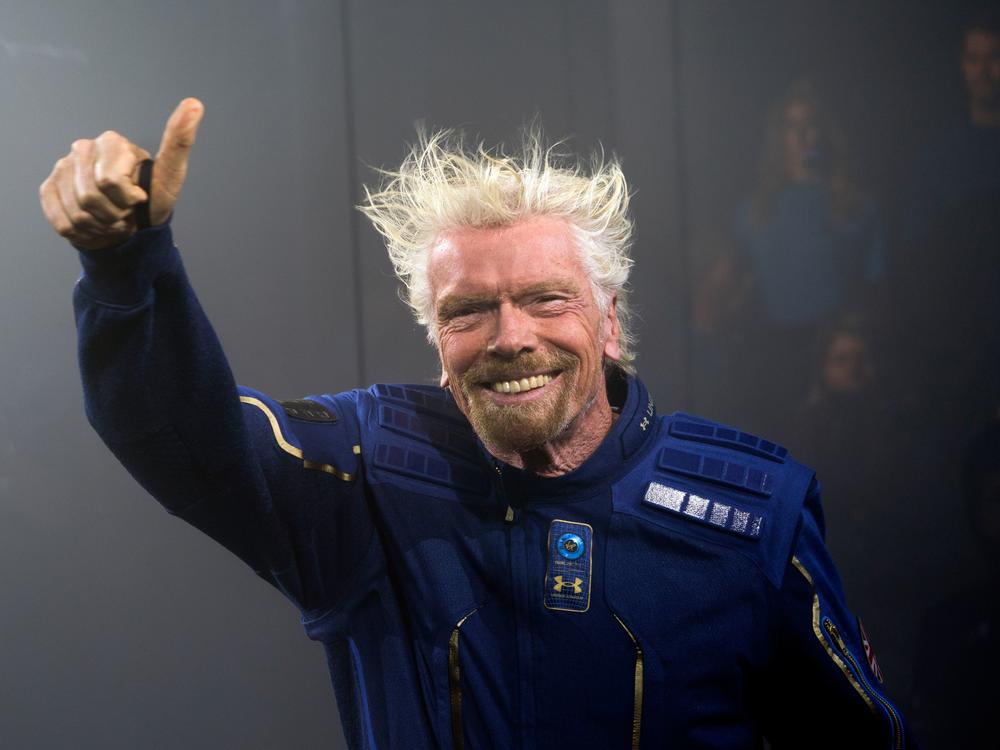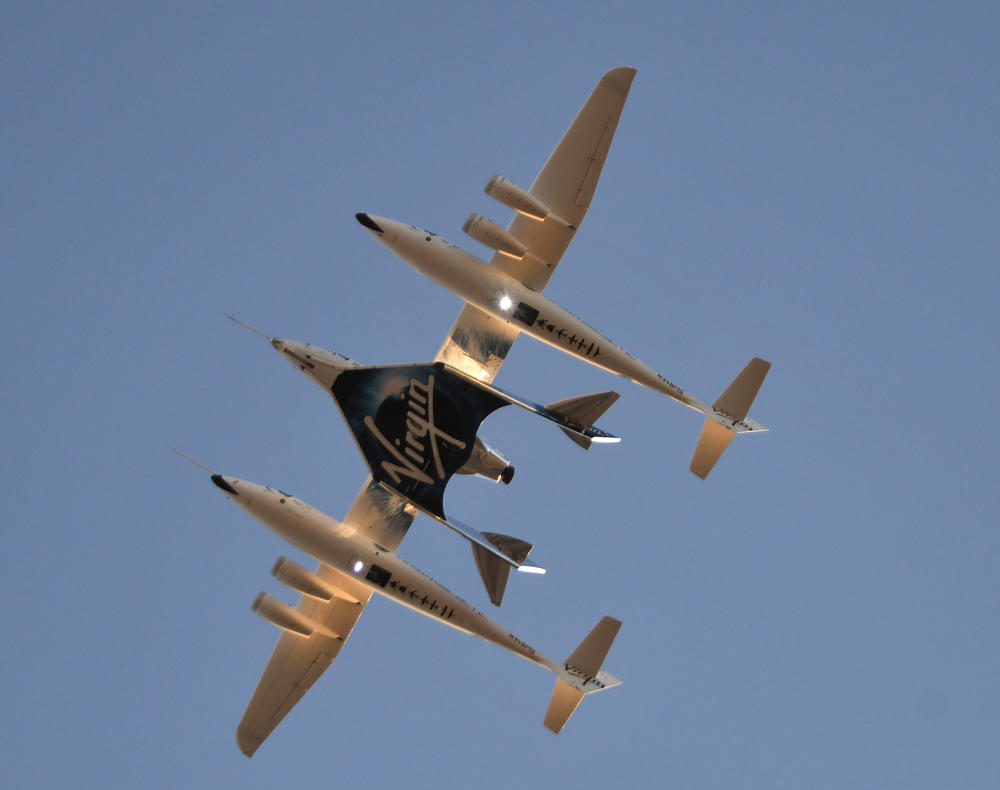Section Branding
Header Content
Bezos Vs. Branson: The Billionaire Space Race Lifts Off
Primary Content
Richard Branson, the British billionaire, plans to blast into space on Sunday from New Mexico aboard a rocket made by his company Virgin Galactic.
Nine days later, Amazon founder Jeff Bezos is scheduled to rocket into space from West Texas in a capsule made by his company Blue Origin.
The high-profile launches are the latest developments in efforts to kick-start the era of space tourism, and it's hoped they will instill confidence in the new spacecrafts — and to satisfy childhood yearnings.
"I was a kid once, standing with my dad and my sister, looking up at the moon, being told that Buzz and Neil were standing on it," Branson told NPR's Morning Edition this week, referring to the Apollo 11 astronauts. "And I just thought, I've got to go to space one day."
Bezos, likewise, says he's dreamed of traveling to space since he was 5.
Branson took his first steps toward realizing his dreams in 2004, when he registered the name Virgin Galactic with the idea of making space travel possible for his generation. Now, his efforts are taking flight.
"I feel like a kid myself," Branson said.
The Virgin Galactic project pushed through tragedy
Branson thought he might be able to accomplish his goal in six or seven years. "But space is very difficult. Rocket science is very difficult. And it's taken 17 years of brave test pilots and 800 engineers to get to a really safe system to take us into space and then, early next year, to start taking members of the public into space," he told NPR.
The Virgin Galactic Unity 22 mission will have two pilots and four "mission specialists" in the cabin, including Branson, whose official role is described as "testing the private astronaut experience."
In 2014, a pilot on a Virgin Galactic test flight was killed when it crashed in California's Mojave Desert. An investigation found that pilot error and design problems were to blame in the crash.
But Branson didn't end the company's drive to space.
"Obviously, our team have made absolutely certain that something like that could never happen again," he said. "At the time, you know, we had to decide. Do we press on or don't we? I sat down with 800 engineers. Because we could rectify that particular issue, we pressed on."
Branson will fly earlier than Bezos, but won't soar as high
Jeff Bezos announced last month that he would go to space on July 20, along with his brother and two other people, on his company's New Shepard.
One of those passengers will be Wally Funk. She is one of the last surviving members of a group of female pilots who, in 1961, were part of a test to see whether women were fit for space travel. They passed many of the same tests as the male pilots, and became known as the Mercury 13 – but NASA never sent them to space.
Branson had been expected to take a Virgin Galactic flight later this year, but after Bezos said he was blasting off, Branson leapfrogged to an earlier launch date.
Unlike a traditional launch, Virgin Galactic uses a special "mothership" to fly the rocket plane up to approximately 50,000 feet. The rocket-powered plane will then be dropped from the mothership, light its rocket and zoom to the edge of earth's atmosphere — about 50 miles in altitude.
The crew will experience a few minutes of weightlessness before the plane plummets back to earth and lands in New Mexico.
There is debate over whether the Virgin Galactic flight path will actually reach "space." Due to its design, the top altitude of Branson's craft falls short of the Karman line recognized internationally as the altitude at which space begins – about 62 miles above sea level (although that definition itself is also under review).
Bezos' Blue Origins flight will go above that line, briefly.
The company's Twitter account posted less-than-subtle statements on Friday about the elevation differential.
"From the beginning, New Shepard was designed to fly above the Karman line so none of our astronauts have an asterisk next to their name," Blue Origin tweeted.
Hundreds are signed up for the chance at space travel
NASA ended its shuttle program 10 years ago, and hoped that private companies would step into the void. And they have. Elon Musk's SpaceX regularly carries astronauts to and from the International Space Station.
More than 700 people have already signed up for commercial passenger flights that Virgin Galactic says will start in 2022, at a price between $200,000 and $250,000 each. Due to the numbers, the company stopped taking reservations. Branson believes the demand will be stratospheric after Sunday's flight.
"When we open up after our trip, I think we're going to be deluged with people wanting to go to space," he said.
NASA's final shuttle commander, Chris Ferguson, said that he's impressed Branson and Bezos are going on the flights ahead of their customers.
"That's one surefire way to show confidence in your product is to get on it," Ferguson said Thursday, according to The Associated Press. "I'm sure that this was not a decision made lightly. I wish them both well. I think it's great."
NPR's Russell Lewis contributed to this report.
Copyright 2021 NPR. To see more, visit https://www.npr.org.


